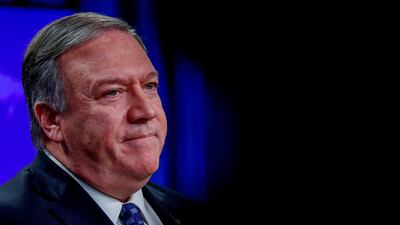US Secretary of State Mike Pompeo has refuted claims that assassinated Iranian General Qassem Suleimani was on a diplomatic mission to Baghdad when he was killed by a US strike last week.
Mr Pompeo on Tuesday spoke with UAE Minister of Foreign Affairs and International Co-operation Sheikh Abdullah bin Zayed about the escalating tensions in the Gulf.
Mr Pompeo thanked Sheikh Abdullah for the UAE's partnership and for recognising the threats posed by Iran’s Islamic Revolutionary Guard Corps' Al Quds Force and by the Iranian regime in general.
Speaking at the State Department on Tuesday, Mr Pompeo called the claim by Iranian Foreign Minister Javad Zarif that Suleimani was on a diplomatic mission to Baghdad “propaganda of the first order”.
"Is there any history that would indicate that it was remotely possible that this kind gentleman, this diplomat of great order - Qassem Soleimani - had travelled to Baghdad for the idea of conducting a peace mission?" Mr Pompeo said, with a hefty dose of sarcasm.
But Mr Zarif has not been the only party to claim Suleimani's reason for being in Baghdad was a diplomatic one. Iraqi acting prime minister Adel Abdul Mahdi claimed Suleimani was in Baghdad to meet him and deliver a response on a diplomatic proposal from Saudi Arabia. Mr Pompeo denied the existence of such proposal. "We know that wasn't true,” he said.
Mr Pompeo defended the decision to target Iran's most senior general and reiterated his view that it saved lives. But the US Secretary of State did not give further details on the “imminent plot” that Suleimani was allegedly planning with his proxy affiliates, and that the US claims would have killed US diplomats and forces.
“What we could clearly see were continuing efforts on behalf of this terrorist to build-out a network of campaign activities that were going to lead potentially to the death of many more Americans," he said.
"It was the right decision.”
Asked about targeting of Iranian cultural sites, which US President Donald Trump threatened but is considered a war crime under international law, Mr Pompeo said all US actions would stay within international law.
He then accused the Iranian regime of undermining the country’s culture, not Mr Trump. “Let me tell you who has done damage to the Persian culture. It's not the United States, it’s the Ayatollah,” he said.
On Mr Zarif's allegation that the US had declined to grant a visa to enable him to address the United Nations in New York, the Secretary of State did not provide details but said Washington will be committed to its obligations under the UN requirements.
On Monday, Mr Pompeo met Saudi deputy defence minister Prince Khalid bin Salman to discuss the escalating tension with Iran. The Saudi official also met US defence Secretary Mark Esper and later in the day US President Donald Trump and his advisers Robert O’Brien, Jared Kushner and Victoria Coates.
The visit was planned in response to escalation with Iran and to consult on the next steps.


























